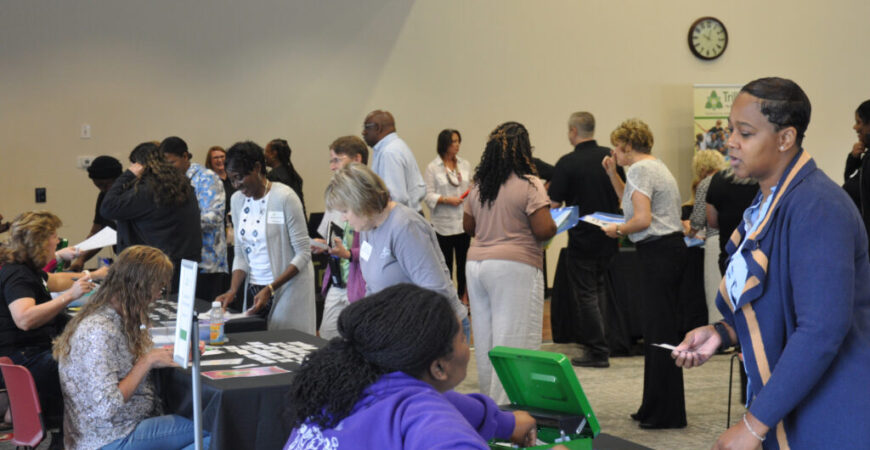KENANSVILLE — Trillium’s Support Transition and Reentry (T-STAR) team held a reentry simulation at the Ed Emory Auditorium in Kenansville last Monday that illustrated the many barriers and challenges individuals must overcome following their release from incarceration through a role-playing exercise. Participants ranging from public defenders, parole officers and peer support specialists were assigned new identities, circumstances and histories before being tasked with overcoming challenges and obstacles that mirrored those faced by individuals recently released from correctional facilities, such as obtaining government identification, securing transportation, paying rent or child support and meeting parole or probation mandated check-ins.
Ernie Lee, district attorney for Duplin, Jones, Onslow and Sampson counties, spoke to participants following a welcome from Sarah Willhite, Trillium Health Resources’ training development director.
“No matter what someone has done, they’re still people,” said Lee, expressing that many who find themselves incarcerated often suffer substance abuse and behavioral issues and struggle to access housing and employment as well as medical and mental health treatment. “I want them to become citizens who make a positive difference to society.”
The simulation consisted of four 15-minute sections each, representing a one-week period (the latter three reduced to 10 minutes for Monday’s session), during which participants were required to complete as many tasks as possible before the timer ran out. Those not in their seats at the end of each section were sent to an isolated seating area on the Ed Amory Auditorium’s stage — a real-life parallel for what those recently released from incarceration face should they fail to adhere to curfew.
Participants were assigned an identity and provided a history for the individual they’d be portraying in the exercise along with transportation tickets that allowed movement to one of the various stations set up around the room representing essential services and resources, such as food banks, plasma donation centers, probation and parole offices, pawn shops and more. Though some profiles included forms of state and federal identification, many did not — making social services a popular destination for participants looking to complete their tasks as assigned before the timer ran out.
Volunteers at each booth further complicated the process, with system issues and lunch breaks impacting the ability of participants to complete their required activities in the time provided.
The end of the first 15-minute week found a majority of participants in jail, unable to complete their tasks or return to their seats before the time expired. As a penalty, they spent two minutes of the next 10-minute week incarcerated, unable to complete vital assignments like substance abuse counseling or probation and parole requirements. Later in the exercise, a counterfeit transportation ticket scandal saw another swathe of participants incarcerated.
Following the exercise, participants discussed their experience and offered insight into the challenges those recently released from incarceration face. Those in attendance agreed that access to transportation was essential for anyone attempting reentry. Jones County Probation and Parole Officer Steven Thompson indicated that in his county, some walk miles to ensure they don’t miss their appointments. “If they’re willing to do that, I’ll give them a ride home.”
According to Willhite, part of the goal for the simulation was to connect resources in an effort to address the challenges those undergoing reintegration into society may face.
 Twitter
Twitter Facebook
Facebook Instagram
Instagram





